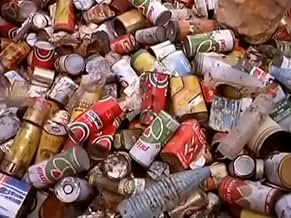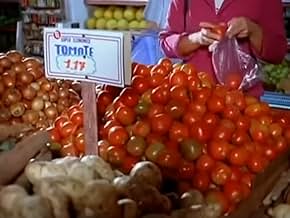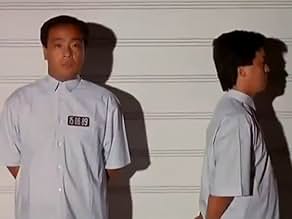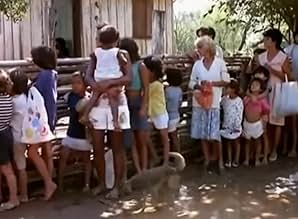A tomato is planted, harvested, transported and sold in a supermarket, but it rots and ends up in the trash. The film follows it to its true end, all to make clear the difference between tom... Read allA tomato is planted, harvested, transported and sold in a supermarket, but it rots and ends up in the trash. The film follows it to its true end, all to make clear the difference between tomatoes, pigs, and human beings.A tomato is planted, harvested, transported and sold in a supermarket, but it rots and ends up in the trash. The film follows it to its true end, all to make clear the difference between tomatoes, pigs, and human beings.
- Director
- Writers
- Stars
- Awards
- 4 wins total
- Director
- Writers
- All cast & crew
- Production, box office & more at IMDbPro
8.57K
1
2
3
4
5
6
7
8
9
10
Featured reviews
Woah
Saw this documentary short subject in my World Society course at UC Santa Cruz. It's about capitalism, told through the story of a tomato. But, thinking back on it, it was much more than just that tomato, that went into the making of the family's dinner, which was bought with money, which was acquired through the mother's perfume sales, which is an alcohol-based topical fragrance oil. If you're wondering what I'm talking about, this is how the film is paced. It is the very reason the word "Tangential" was created. Furtado is so crafty at taking you to places you never think you'll go; from painfully hilarious irony (the monty python-esque first 5 minutes), to head-battering shock (the history of "the second");just by mentioning a single word, you could travel from a dollar bill to a pile of emaciated bodies, within a matter of seconds. And none of the connections are far-fetched. His story is based on the theory of six degrees of separation, and how he arrives at those final, latent images of haunting truth is a trip that must be taken.
I was recently compiling a list of my favorite movies of 2000, and the best films I saw were the reissues of "The Exorcist" and "Blood Simple", and this, a 15 minute documentary about capitalism. Very weird, but it is true. If I ever get the chance to see this again, I will relish every second of it as if it were the first time. And if you are a student, you should check your campus library for "Ilha das flores", because it is amazing.
I was recently compiling a list of my favorite movies of 2000, and the best films I saw were the reissues of "The Exorcist" and "Blood Simple", and this, a 15 minute documentary about capitalism. Very weird, but it is true. If I ever get the chance to see this again, I will relish every second of it as if it were the first time. And if you are a student, you should check your campus library for "Ilha das flores", because it is amazing.
10huineman
Will keep you pensive for long
Very seldom is one given the opportunity to watch a documentary like Ilha das Flores. It is less a TV product than an essay not written but filmed, and well filmed indeed. The ideas displayed throughout barely quarter an hour are so many and so profound that you might need more than one view to assimilate them all; but the script is so agile that you will never grow bored. Instead, even if you are not in the mood for documentaries at the beginning, will find yourself deeply interested in this humble production within minutes, if not seconds. But remember, you are not dealing with an entertainment product but with one of the best lessons of ethics you might come across ever. Anyway, that you will realize for sure at the end of the film, when its ideas, lingering in your head, will keep you pensive for long.
10thbzcrt
A thrilling social documentary
That's the kind of movie you'll see quite by chance, one evening on television. And you will never forget it.
"Ilha das flores" is the story of a tomato, from the field where it is cultivated to the dustbin, and beyond. It's fun, and, at the same time, it tells you a lot about the economy and the Brazilian society. What is really unique for a documentary is that the story is as pleasant to follow as in a fiction, and the end is one of the more stunning and moving end I have ever seen in a movie.
"Ilha das flores" is the story of a tomato, from the field where it is cultivated to the dustbin, and beyond. It's fun, and, at the same time, it tells you a lot about the economy and the Brazilian society. What is really unique for a documentary is that the story is as pleasant to follow as in a fiction, and the end is one of the more stunning and moving end I have ever seen in a movie.
Best thirteen-minute film I've ever seen
Not that I've seen a lot, of course. I caught this short in my documentary film class at the beginning of the semester. Unfortunately, I never saw another film better than this one. If you can find it, definitely check it out. The film says more about the human condition in fifteen minutes than most similarly themed films say in two hours. Devilishly humorous, the film hints along the way that there is more at stake than the running joke about a tomato would indicate. It's crucial to know as little as possible, so if you have a good independent video store nearby, seek it out and don't ask questions.
10Trufó
Funny... at first.
Funny at first, demolishing in the end. When I saw this movie for the first time I spend the first minutes laughing: the editing is fast paced and the voice over explains one after another different concepts that apparently are barely connected. But in the end all grows into a perfectly mounted description of the economical and political aberrations of our times, all in less than 30 minutes.
Did you know
- TriviaThe short opens with three short sentences on screen: "Este filme não é um filme de ficção. Existe um lugar chamado Ilha das Flores. Deus não existe." [This film is not a work of fiction. There is a place named Island of Flowers. God does not exist.]
- ConnectionsFeatures Nazi Concentration and Prison Camps (1945)
Details
- Release date
- Country of origin
- Language
- Also known as
- Island of Flowers
- Filming locations
- Ilha das Flores, Porto Alegre, Rio Grande do Sul, Brazil(30º 12' 30" S, 51º 11' 21" W)
- Production company
- See more company credits at IMDbPro
- Runtime
- 13m
- Sound mix
- Aspect ratio
- 1.37 : 1
Contribute to this page
Suggest an edit or add missing content























